
The prosecution of ‘Soldier F’ over the Bloody Sunday massacre has been described as “one of the crimes of the century” by the organiser of a protest set to bring parts of central London to a standstill.
Gavin Wragg, who was behind a similar protest in April, spoke as former servicemen and their supporters converged on Whitehall to form a human chain around Westminster on Saturday.
Soldier F, who cannot be named for legal reasons, is the only person from the 1st Battalion Parachute Regiment ever to face trial for the deaths of 13 civil rights protesters and one passerby in Londonderry in January 1972.
He is charged with the murder of William McKinney, 27, and 22-year-old James Wray, and the attempted murder of four other men – Joseph Friel, Michael Quinn, Joe Mahon and Patrick O’Donnell.
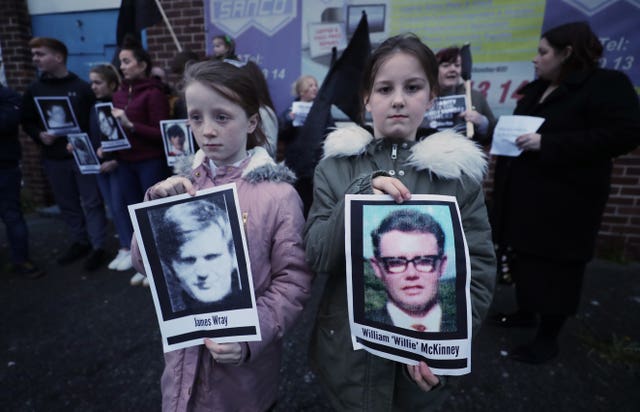
He faces a final charge of “attempted murder of a person or persons unknown”.
The Saville Report, an inquiry set up by Tony Blair in 1998 and which published its findings in 2010, also found Soldier F to have killed two other men – Bernard McGuigan, 41, and 31-year-old Patrick Doherty.
The inquiry found Mr Wray had been shot in the back while fleeing and that he was shot a second time as he lay dying, while Mr McKinney was also shot in the back.
Soldier F learned he was to be prosecuted in March of this year and the case is currently in its preliminary stages in Northern Ireland, and the decision by the Northern Irish authorities sparked outrage in Britain.
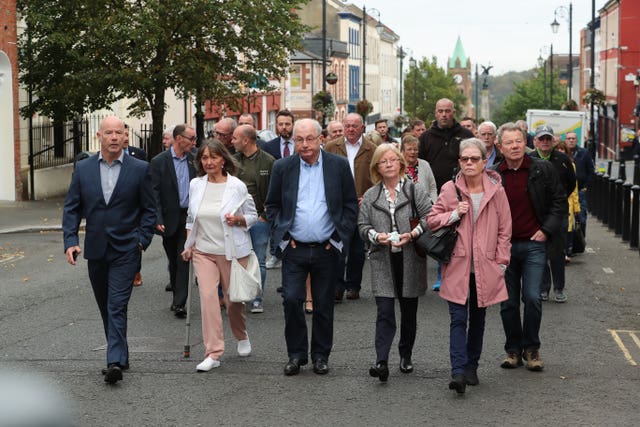
By 10.30am on Saturday morning around 500 people with flags and “support Soldier F” t-shirts had gathered in Trafalgar Square, with the march due to set off for Westminster at 12pm.
Speaking to the PA news agency about the prosecution, Mr Wragg said: “I got more and more enraged by it and I made a Facebook video saying we need people to come together and show this is wrong because so many people don’t know.”
Mr Wragg, who served with the Royal Transport Corp for 10 years, has dubbed the movement “Operation Rolling Thunder” and a protest in April saw 11,000 people including several biker gangs take to the streets in London.
“It’s appeasement by the British government, it’s just to appease the IRA – we’ve got a peace process with Northern Ireland and all the terrorists were pardoned, they were all set free for the horrific crimes they committed.
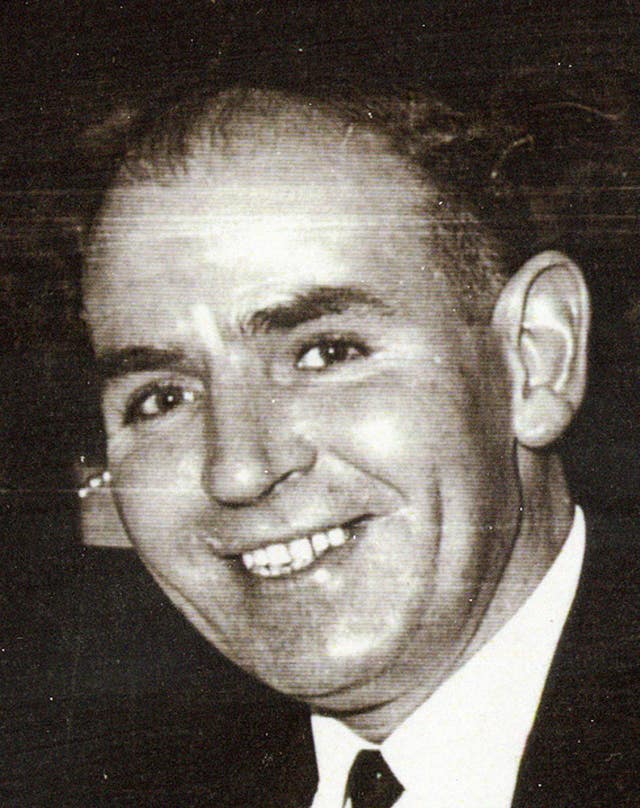
“Now we are suddenly prosecuting only British soldiers.”
He added: “You either have a peace agreement for all or nobody.”
Mr Wragg, 56, said the protest was not targeted at the families of the victims but said the relatives of the British soldiers killed in Northern Ireland had also never received justice.
He said he believed in the right to peaceful protest but emphasised that shots had been fired at British troops during the build-up to the Bloody Sunday killings.
The Saville Report found that an “opportunistic” sniper shot had been fired at British soldiers by an IRA member at around 4pm, but no-one was hit and the bullet lodged in a drain pipe.
Stones and other projectiles were also found to have been thrown by rioters.
“We understand the feelings of the people of Northern Ireland – they were innocent people – but to say five soldiers are to blame for everything, that’s just scapegoating,” Mr Wragg said.
One 49-year-old former serviceman, who served in the Royal Signals, said: “I’m just showing support. Soldier F has been repeatedly found innocent – three times.
“Taking him to court again is disgusting.”
Another former soldier, who also asked not to be named, said: “It’s not just about one individual, it’s about many individuals and about the future.
“It’s not just about Northern Ireland but any conflict we’ve been involved in and could be involved in.”
The 47-year-old, who served in the army between 1990 and 1998, added: “Why should we, when we’re following orders, face prosecution?”
His friend, who served in Northern Ireland in the Navy in the 1990s, said: “What really gets me is that they’ve brought back Diplock courts – Soldier F is facing trial by a single judge without a jury and no-one should ever be tried without a jury.
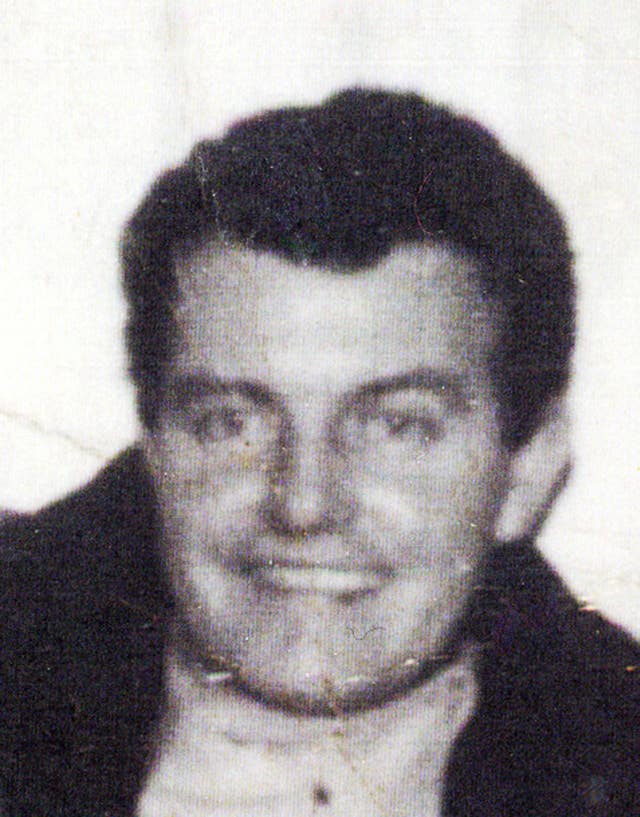
“It’s a political thing rather than a justice thing. He’s been thrown to the wolves.”
The 58-year-old said: “The situation in Northern Ireland is never going to go away.
“I was born in Northern Ireland and my family are from there. It’s never going to go away.”
Soldier F, who is now in his 70s, is not present on the march and has chosen not to get involved in the movement.
However, 78-year-old Dennis Hutchings – another former soldier facing trial for a killing during the Troubles – was present, and rode atop an armoured car during the march down Whitehall.
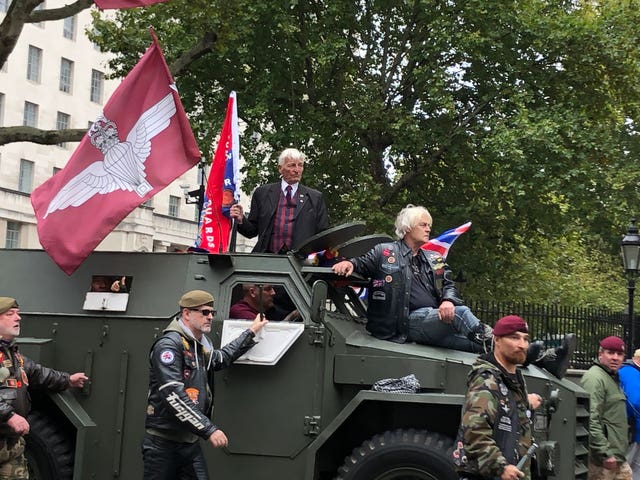
Mr Hutchings is charged in connection with the death of 27-year-old John Patrick Cunningham, who was fatally shot in the back fleeing an army patrol in County Tyrone in 1974.
The former soldier, who served with the Life Guards, is accused of the attempted murder and attempted grievous bodily harm of Mr Cunningham, who suffered from learning difficulties.
After the protest outside Parliament, many of those involved migrated to a makeshift camp by Wellington Arch where they were planning on spending the night.
One RAF veteran, who served in Northern Ireland in the 1990s, said: “This is a protest against the persecution of Northern Ireland veterans.
“We don’t agree with it seeing as all the IRA and other paramilitaries got off scot free.”
Referring to his time in Northern Ireland during the peace process, he said: “It was supposed to be peace but there was no peace – the things I saw that happened there that were all covered up.”
He continued: “Killings there were a daily occurrence, the [Northern Irish] lived with it day in, day out but on the mainland you didn’t hear about it unless it was a major attack.”
A second man, 62, who served in Northern Ireland in the third battalion of the Light Infantry in 1975 and 1976, said: “Dennis Hutchings has been investigated numerous times and now he’s being persecuted again.
“The Police Service of Northern Ireland is just a front for the IRA because all they do is do their bidding.”
Describing his tour in the aftermath of Bloody Sunday aged just 18, he said: “Kids coming out of school would throw stones, bottles and bricks and obviously the IRA would target us along with any other paramilitaries.”
Police are reviewing all murder cases, considering opportunities for forensic evidence and availability of witnesses when deciding which to tackle first.
Detectives have said they do not prioritise military cases, which account for approximately 30% of workload, but at least six former military personnel have been prosecuted in recent years.
Of 26 prosecution cases were brought since 2011 involving legacy issues, 21 involved republican and loyalist paramilitaries, recent research showed.


House Rules
We do not moderate comments, but we expect readers to adhere to certain rules in the interests of open and accountable debate.
Read the rules here